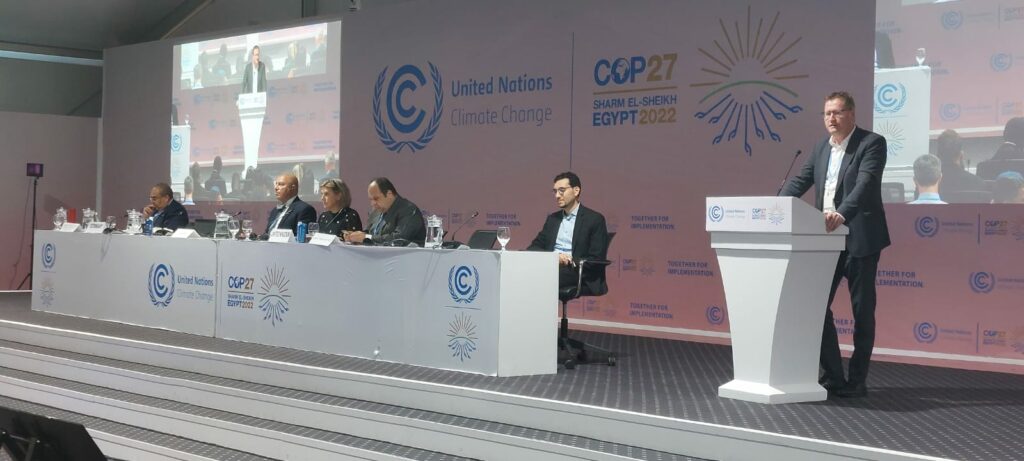
On November 17, 2022, it is Solutions Day at the climate conference COP27 in Sharm el-Sheikh, Egypt. While in multilateral negotiations, countries continue to discuss how to ramp-up climate finance and compensate the most vulnerable countries for irreversible damage, the transport community committed to solutions for the sector. Various new initiatives on how to accelerate implementation collaboratively were presented. So even though there was no dedicated transport day, nor a transport pavilion, it felt like transport was everywhere today.
At 12:30 pm local time the Egyptian COP Presidency launched its Low Carbon Transport for Urban Sustainability (LᶜO₂TUS) initiative aiming at decarbonising urban transport systems worldwide and especially in the Global South.
Last year at COP26 we saw a lot of commitments on Electric Mobility. Developing countries need sustainable mobility solutions to improve access and limit emissions. This is why Egypt decided to work the LOTUS initiative at COP27.
Kamel al-Wazir, Minister of Transport, Egypt
This is remarkable, because it is the first time that sustainable mobility, incl. AVOID or reduce distances, SHIFT to efficient modes and IMPROVE vehicle technologies, has been put up prominently on the agenda of a COP Presidency and in this way got increased attention. Furthermore, it directly links to the SDGs and establishes a link between the two global agendas. Last but not least, the initiative puts financing on the agenda.
However, it remains to be seen how this initiative will be implemented. While according to the official description a number of non-state actor organizations want to engage, no parties – UNFCCC jargon for country governments – have formally joint so far. The presidency still has a lot of work to do in the coming months.

How commitments can be extended and maintained was demonstrated later at 3:00 pm. Building off the Zero Emissions Vehicles (ZEV) Declaration of the British COP26 presidency, this year the Accelerate to Zero (A2Z) Coalition was launched at the UK pavilion. By providing a platform for leading initiatives the A2Z Coalition works towards all sales of new cars and vans being zero emission no later than 2035 in leading markets and 2040 globally. It includes a campaign website that provides more details.
This was complemented by the UK-USA-co-chaired Zero Emission Vehicles Transition Council (ZEVTC) will launch its new yearly Action Plan, setting out its priorities for 2023. Among those priorities is a global commitment – signed by the US, Germany, Japan, the Netherlands, South Korea, Sweden and the UK – outlining collective ambition to mobilise more assistance and align existing funds to support ZEV transitions in emerging and developingcountries this decade. For Germany, the Ministry for Economic Cooperation and Development (BMZ) is engaging through global and bi-lateral funding prorammes.
Two more specific elements are remarkable as it shows how a presidency intitiative can evolve: Firstly, a scalable ZEV Rapid Response Facility (ZEV-RRF) addresses short-term, urgent technical assistance needs of Global South governments. It aims at helping to unlock larger scale projects and funding for their ZEV transition. Secondly, the US who launched the Zero Emission Vehicles Emerging Market Campaign (ZEV-EM-C), a one-year campaign that seeks to accelerate zero-emission passenger vehicle deployment in emerging markets. For both approaches not much information is available to date but certainly will be presented soon.
Freight remains a blind spot of transport decarbonization. However, new country signatories signed the Global Memorandum of Understanding on Zero-Emission Medium- and Heavy-Duty Vehicles, including the USA, several European countries and a number of small island states. The MOU aligns leading countries on the same level of ambition for zero-emission medium- and heavy-duty vehicles (ZE-MHDVs). Country signatories strive towards a non-binding target of 30% of newly sold MHDVs being zero emission by 2030, and 100% by 2040.
An important mode for (international) freight is martime transport and it decarbonization is crucial. Hence it was good to see that the shipping stakeholders are actively looking for solutions.
Following the Clydebank Declaration for green shipping corridors created at COP26, green shipping corridors are increasingly considered an important approach for shipping’s transition towards zero emissions. So on Nov 17th, the 2022 Annual Progress Report was published. In addition, the Zero-Emission Shipping Mission that aims to demonstrate commercially viable zero-emission ships by 2030 will present its Green Shipping Corridor Hub, an online tool that shows announced green shipping corridors worldwide, a map for matchmaking between interested partners in the development of such corridors as well as a library of available info material on the topic. In addition, the Green Shipping Challenge was launched by the United States Department of States and the Government of Norway.
Last year’s initiatives have proven influential pieces of the puzzle that is decarbonizing transport. They perform better than some commentors have predicted. It seems they remain important for increasing ambition in transport. We’ll stay curious to see how the LOTUS initiative evolves and if the dynamic of the EV initiatives can be expanded beyond vehicle technology and electrification. In order to limit the additional need for renewable electricity from electric vehicles, increasing motorization and travel demand (distances) is a challenge that endangers the 1.5 degree target.
The urban mobility initiatives TUMI (focusing on capacity building, access to finance and electric buses) and MobiliseYourCity (focusing on sustainable urban mobility planning), which are co-funded by Germany and where GIZ is involved in, will continue to work on this challenge. The GIZ transport team was present in Sharm el-Sheikh through the IKI-funded TRANSfer programme and on behalf of the German Ministry for the Economy, and Climate Action (BMWK).
Many of COP27’s launches and reveals are built on declarations generated at last year’s COP26 in Glasgow. But this is not all that came from those initiatives. Two weeks ago, GIZ colleague Friedel Sehlleier looked at where these initiatives stand and what they have in store for the future. Click here to read more: https://changing-transport.org/still-alive-an-update-on-the-cop26-initiatives-for-transport-decarbonization/
 COP27 in Sharm El-Sheikh, Egypt ©Kiara Worth/ UNFCCC Flickr
COP27 in Sharm El-Sheikh, Egypt ©Kiara Worth/ UNFCCC Flickr